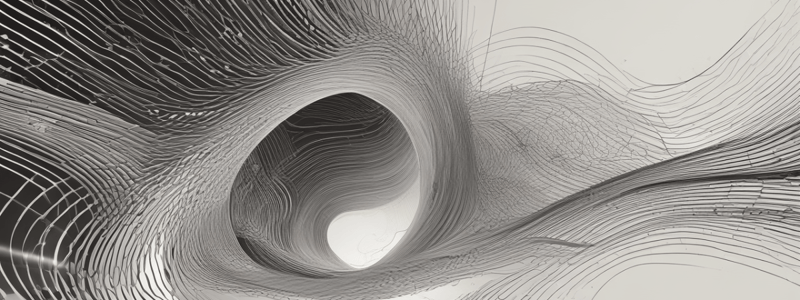Podcast
Questions and Answers
What is the wave parameter that describes a wave's energy?
What is the wave parameter that describes a wave's energy?
- Wavelength
- Frequency
- Amplitude (correct)
- Speed
What is the unit of measurement for intensity of sound waves?
What is the unit of measurement for intensity of sound waves?
- Watts per square meter (correct)
- Joules per second
- Decibel
- Hertz
How does the volume of a sound wave relate to its amplitude?
How does the volume of a sound wave relate to its amplitude?
- The volume is directly proportional to the amplitude (correct)
- The volume is proportional to the square of the amplitude
- The volume is inversely proportional to the amplitude
- The volume is unrelated to the amplitude
What is the frequency of a sound wave that has 440 wave cycles passing by every second?
What is the frequency of a sound wave that has 440 wave cycles passing by every second?
What is the frequency of the musical note 'Concert A'?
What is the frequency of the musical note 'Concert A'?
What is the primary factor that determines the pitch of a musical note?
What is the primary factor that determines the pitch of a musical note?
What is the range of frequencies that humans can typically hear?
What is the range of frequencies that humans can typically hear?
What type of sounds are above 20,000 Hz?
What type of sounds are above 20,000 Hz?
What is the term for sounds that are too low for humans to hear?
What is the term for sounds that are too low for humans to hear?
What is the difference in frequency between Middle C and Concert A?
What is the difference in frequency between Middle C and Concert A?
What type of waves are produced when a guitar string is plucked?
What type of waves are produced when a guitar string is plucked?
What is the difference between the two sounds played in the introduction of this lesson?
What is the difference between the two sounds played in the introduction of this lesson?
What do compressions and rarefactions in air comprise?
What do compressions and rarefactions in air comprise?
What is the medium used in the examples of sound waves in this lesson?
What is the medium used in the examples of sound waves in this lesson?
What is the characteristic of sound waves that determines how loud or soft it is?
What is the characteristic of sound waves that determines how loud or soft it is?
Flashcards are hidden until you start studying
Study Notes
Sound Waves
- Sound waves are characterized by their wavelengths, amplitudes, and other parameters.
- The pitch of a sound refers to the perception of frequency, with high-pitched notes having a high frequency and low-pitched notes having a low frequency.
Amplitude in Sound Waves
- Amplitude is a measure of how far particles oscillate back and forth in a longitudinal wave, such as sound.
- In a high-energy wave, the amplitude is large, because the particles oscillate over a large distance.
- In a low-energy wave, the amplitude is small, because the oscillations are small in size.
Intensity and Volume
- Intensity is measured in units of energy over the area and time, and is detected as the loudness of a sound.
- The decibel scale is a logarithmic scale used to measure the intensity of sound waves.
- Volume is the perception of loudness from the intensity of a sound wave, and is proportional to the amplitude of the sound wave.
Frequency in Sound Waves
- Frequency is the number of wave cycles passing by every second, measured in Hertz (Hz).
- A sound wave with a frequency of 262 Hz has 262 wave cycles passing by every second.
- A plot of pressure over time can be used to visualize the periods between successive compressions of a sound wave.
Pitch and the Acoustic Range
- The acoustic range represents the sounds that humans can hear, from 20 Hz to 20,000 Hz.
- Sounds above 20,000 Hz are considered ultrasound, while sounds below 20 Hz are considered infrasound.
- Humans can typically hear sounds as low as 20 Hz and as high as 20,000 Hz.
- Musical pitches can be put in order from high to low frequency, with high-pitched notes having a high frequency and low-pitched notes having a low frequency.
Studying That Suits You
Use AI to generate personalized quizzes and flashcards to suit your learning preferences.




